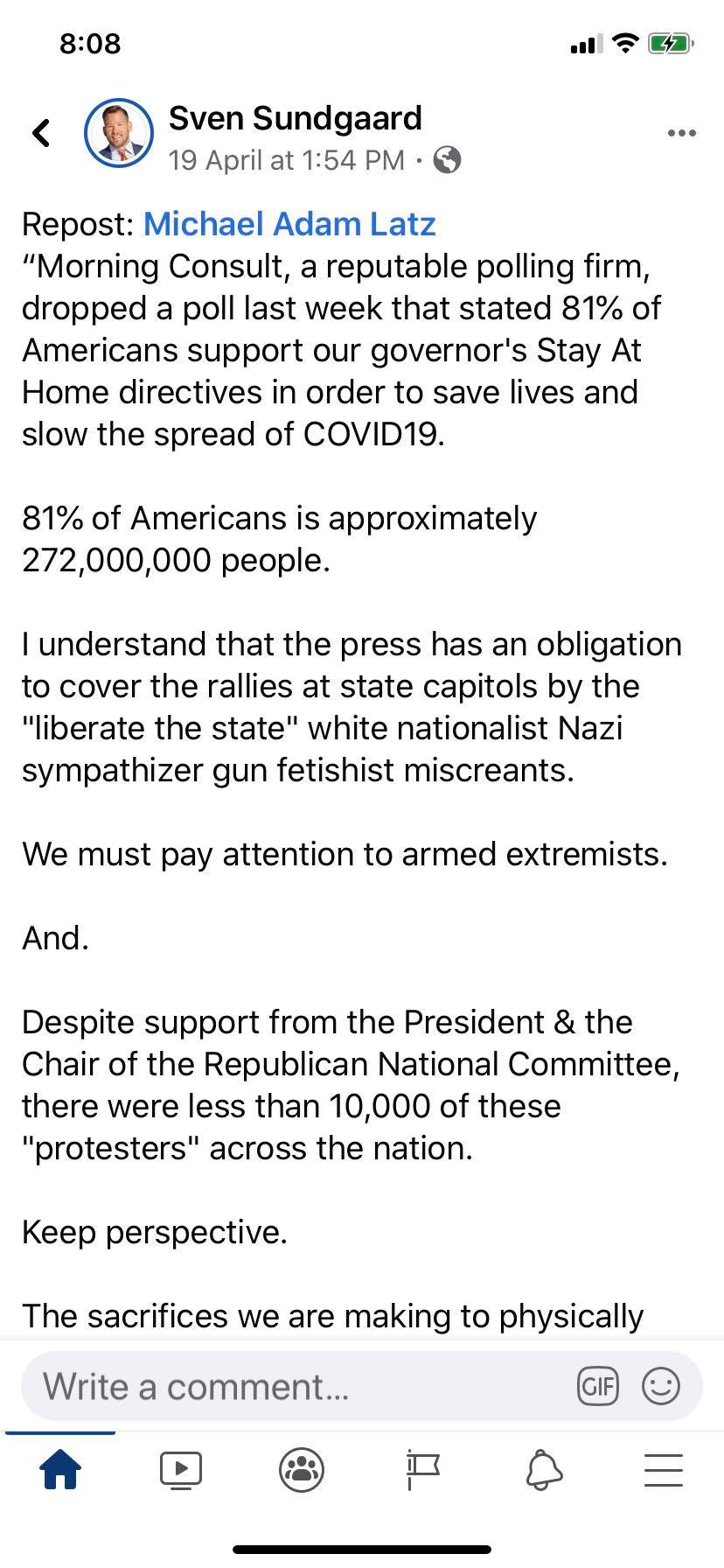
Clearly, KARE-TV’s firing of morning weatherman Sven Sundgaard is, as they say in show biz, a story “with legs”. Whether because of a public hunger for anything that isn’t pandemic-related, or whether because of Sundgaard’s popularity within the local gay community, or simply because a lot of people like him personally, the story continues to command unusual public interest.
Most of what I’ve read on social media sounds like it’s coming from people outside the news profession. The vast majority are saying Sundgaard got a raw deal from KARE, (owned by Gannett/TEGNA), for simply retweeting a comment made by a popular Minneapolis rabbi. It’s a different story though, from current or former professional journalists. While most express sympathy for Sundgaard, few if any have made any criticism of the basis of a contractual “ethics” policy that produces a situation such as his.
The common attitude among pro journalists being, “There are rules, and he violated the rules”, without any (that I’ve read) questioning the basis of said rules. It’s as though, “If it’s in a contract, it’s proper.” End of discussion.
At this point I freely admit that among people who worked in the news game I am an outlier. And bigly so. I doubt there’s anyone still in journalism in this town who will say publicly what I have said before and will say again here. And even among those who have left the business, the fraction of those agreeing with this view is at best in the high single digits.
The essence of my argument against a media “ethics” policy that prohibits — or can be interpreted to prohibit — expressions of political opinion by employees in their private lives is that it is designed to avoid and tamp down criticism from people already implacably hostile to fact-based, professional journalism. Such a policy is at best a thin filter against bad faith critics of serious, committed, truthful reporting. And at worst, it normalizes, as a consequence of distilled and denatured journalism, an irrational and highly-biased counter narrative.
By that last line what I mean is this: What will we think if among the “continued violations” Sven Sundgaard committed against KARE’s “ethics code” it is revealed that he had called on the carpet for making approving comments about peer-reviewed climatological studies? Studies that conform to the thinking of 97% the world’s climatologists that human activity is the primary driving force behind climate change? It’s a nearly incontestable view at this point, but one that is all but wholly absent from TV weathercasting.
What will we think if KARE’s code of “ethics” has been interpreted to say that peer-reviewed science is a “political opinion” and therefore warrants a reprimand?
If a code of “ethics” prohibits applying science to weather forecasting, I’d call that “denatured” reporting.
Or, in Sundgaard’s case, what if his standing in the gay community is based to some degree on his advocacy for gay rights? What if that has been categorized as “political opinion” and therefore deservng of reprimand?
I spent a few years covering local newsrooms and talking to news managers about screw ups, blunders, public relations, public complaints and the nature of reporting news in ways that sustain and enhance profits. And I can tell you the majority of them, off record of course, were candid about simply avoiding the hassles of some weird fringy thing going viral. Who needs a lawn sign in some reporter’s yard, or a comment a staffer made in an e-mail swelling up into a ridiculous, irrational high-profile controversy about “bias”? Sure, these things are almost always driven by the same bad faith cranks. But who needs it? There’s no upside. Plus, there’s a very real bottom line. The spectacle alone … might impact ratings and therefore revenue. And when that happens, jobs are on the line.
Every serious news organization makes earnest efforts to keep political commentary out of basic reporting. Most employ tiers of editors to keep precisely that kind of thing off the air and out of print. To which, I generally say, “Okay, fine.” I can get plenty of the “whys” elsewhere.
But in Sundgaard’s case, as in silly stuff like lawn signs, we’re talking private expressions that are the right of every citizen. First Amendment stuff, in other words.
Sundgaard has been quoted saying he’s considering his options. I’m told by former KARE employees that his departure paperwork likely requires him to keep his mouth shut if he wants whatever severance/ benefits they’re giving him. More to the point, unless he’s the scion of a wealthy family, the likelihood of him alone being able to finance a lawsuit against Gannett, Inc. will be daunting, at best.
But we now live in an age of vast social media. It is a far, far different media environment than even 15 years ago. In 2020 every one of us has both the ability and incentive to be a publisher. (Many media companies encourage social media activity.) So the validity of employment contracts prohibiting everything from promoting factual science, to advocating for minority rights, to, hell, sharing the opinions of respected local faith leaders that — yes, bad faith characters — waving guns and historical symbols of oppression is ugly and sinister seems something worthy arguing out via class action.
When I first wrote about Sundgaard last week, I wondered if anyone in the journalism game would step up in his defense. What we’ve got to date was an opinion piece by former Star Tribune writer/editor Claude Peck … sympathizing with Sundgaard’s predicament but wholly endorsing the long-held rules of the game.
Said Peck, “Neutrality is partial and imperfect and even something of a charade, but asking journalists to refrain from political expression (and conflict of interest) is a good idea at media outlets that seek to report and present stories for readers across a wide political bandwidth. Not requiring political neutrality from news-side journalists (and I mean all of them, not just political reporters) has a corrosive effect on the practice of ambitious, well-rounded journalism.”
Peck and I crossed paths back in the hoary days of alternative weeklies, and I think of him as an entirely decent guy. But what he says in that piece is full-on, deep-establishment thinking. Truly the party line. And the bit about niggling stuff like lawn signs or the like having, “a corrosive effect on the practice of ambitious, well-rounded journalism” is something I’d love to see submitted for long-form transparent dissection.
Commercial journalism does not want the hassle of constantly defending itself against accusations of “bias” from bad faith actors. It’s bad for business. Therefore it aspires to a perspective of “neutrality” in anything with a whiff of potential partisanship.
But here’s the thing, “neutrality” is itself a political position. “Political” in that it is carved out, adopted, embraced and enforced for self-serving purposes.
Requiring “neutrality” in employees’ personal lives is not only an implicit concession that bad faith attacks have merit, and that the station/paper is incapable of producing “neutral” reporting, but worse, it serves to enhance the vitality and influence of unethical “miscreants”, as Rabbi Latz described them.

